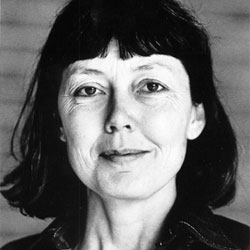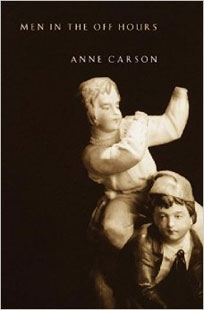Griffin Poetry Prize 2001
Canadian Winner
Book: Men in the Off Hours
Poet: Anne Carson
Publisher: Vintage Canada, Jonathan Cape (UK), Alfred A. Knopf (USA), Cape/Random House (Australia)

Biography
Anne Carson lives in Montreal, where she is Director of Graduate Studies, Classics, at McGill University. Her first book published in Britain, Glass and God, was shortlisted for the 1998 Forward Prize; her second, Autobiography of Red, was shortlisted for the National Book Critics Circle Award and the T.S. Eliot Prize. She has been the recipient of the Lannan Award, a Pushcart Prize, and the MacArthur Fellowship, and was named a member of the Order of Canada in August, 2005. Her recent works include Decreation, which combines poetry with opera libretto, oratorio, essays and more, published by Knopf, and her translation of Grief Lessons: Four Plays by Euripides, published by New York Review Books Classics.
Anne Carson was a judge for the 2010 Griffin Poetry Prize. In 2014 she won the Griffin Poetry Prize for a second time.
Judges’ Citation
“Anne Carson continues to redefine what a book of poetry can be; this ambitious collection ranges from quatrains studded with uncanny images (‘Here lies the refugee breather/who drank a bowl of elsewhere’) to musing verse essays, personal laments, rigorous classical scholarship, and meditations on artists’ lives, caught in the carnage of history. All are burnished by Carson’s dialectical imagination, and her quizzical, stricken moral sense.”
Anne Carson reads Seated Figure With Red Angle (1988) by Betty Goodwin (from Decreation)
Seated Figure With Red Angle (1988) by Betty Goodwin, by Anne Carson
Seated Figure With Red Angle (1988) by Betty Goodwin
If body is always deep but deepest at its surface.
If conditionals are of two kinds factual and contrafactual.
If you’re pushing, pushing and then it begins to pull you.
If police in that city burnt off people’s hands with a blowtorch.
If quite darkly colored or reddish (bodies) swim there.
If afterwards she would sit the way a very old person sits, with no pants on, confused.
If you reach in, if you burrow, if you risk wiping in.
If a point that has been fed over years becomes a little bit alive.
If the seated figure started out with an idea of interrogation.
If there was a quality of very strong electrical light.
If you had the idea of interrogation.
If interrogation is a desire to get information which is not given or not given freely.
If buried all but traceless in the dark in its energy sitting, drifting within your own is another body.
If at first it sounded like rain.
If your defense is perfect after all it was the trees that walked away.
If objects are not solid.
If objects are much too solid.
If there are no faces, if faces are not what you interrogate.
If red makes you think of chance or what chance operates with.
If the feet cross in a way that sucks itself under, sucks analogies (Christ) under.
If as Artaud says anyone who does not smell cooked bomb and condensed vertigo is not worthy of being alive.
If you choose what to undo, if you know how you make that choice.
If you lead her to water.
If you bring her a gift say one of Pascal’s thoughts.
If you bring ‘infinite fractions of solitude’ (Nabokov).
If you bring a bit of Artaud like ‘all writing is shit all writers are pigs.’
If conditionals are of two kinds possible and impossible.
If she slides off, if you do.
If red is the color of cliché.
If red is the best color.
If red is the color of art pain.
If Artaud is a cliché.
If artists tell you art is before thought.
If you want to know things like where that leg is exactly.
If the horses were exhausted.
If she begged, if she came to the table, if the sequence doesn’t matter.
If it begins, a trickle, this think slow falling of the mind.
If you want to know why the sliding affects your nerves.
If you want to know why you cannot reach your own beautiful ideas.
If you reach instead the edge of the thinkable, which leaks.
If you stop the leaks with conditionals.
If conditionals are of two kinds real and unreal.
If nothing sticks.
If she waits alongside her.
If Miroslav warned us that experimental animals should not be too intelligent.
If to care for her is night.
If an enigma came into the room.
If all the other enigmata fought to get out.
If outside of here the light has gone from the tops of the trees that rise over a brick wall opposite.
If conditionals are of two kinds now it is night and all cats are black.
If how many were killed by David exceeds how many were killed by Saul by tens of thousands.
If they don’t feel pain the way we do.
If you drove here with toys in the backseat.
If you wrote a word on the floor of the cell in waterdrops and videotaped it drying.
If Vitruvius says no temple can be coherently constructed unless it is put together exactly as a human body is.
If red is the color of italics.
If italics are a lure of thought.
If Freud says the relation between a gaze and what one wishes to see involves allure.
If you cannot remember what word you wrote.
If art is the servant of allure.
If Vitruvius does not talk about taking temples apart but we may assume the same canon applies.
If there is no master of allure.
If conditionals are of two kinds allure and awake.
If no matter how you balance on the one you cannot see the other, cannot tap the sleep spine, cannot read what that word was.
If ‘contrafactual’ applied to conditionals means the protasis is false.
If (for example) ‘had you not destroyed the barometer it would have forewarned us’ implies that we are now standing in a storm of rain.
If as a matter of fact it is a clear night I would say almost relentlessly clear.
If conditional comes between condiment and condolence.
If you do not want to remember what word it was.
If your life bewilders you (sly life).
If the rain lashes your face like manes of all the horses of this century.
If conditionals are of two kinds graven and where is a place I can write this.
© 2005 by Anne Carson
More about Anne Carson
The following are links to other Web sites with information about poet Anne Carson. (Note: All links to external Web sites open in a new browser window.)
- Review of Men in the Off Hours by Anne Carson (Salon)
- Review of Nox by Anne Carson (New York Times)
- On the Irreconcilable Temptations of Anne Carson by Karen Solie (Literary Hub)
Have you read Men in the Off Hours by Anne Carson? Add your comments to this page and let us know what you think.
